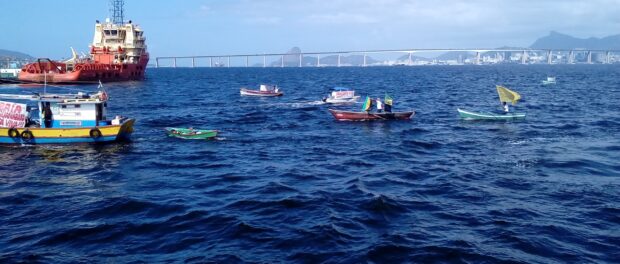
On Saturday, diverse groups interested in the cleanup of the Guanabara Bay came together for a boat ride in support of the bay’s fishermen. Fishing communities in the Guanabara Bay have been consistently harmed by pollution and direct violence from the petroleum industry, as well as the false promise of a cleaner bay for the 2016 Olympic Games.
The event was organized by the network-based organization Baía Viva, Casa Fluminense, the Association of Free Fishermen of Tubiacanga (APELT), Forum of Fishermen and Friends of the Sea, Goethe-Institut Rio de Janeiro, and the Association of Cyclists of Ilha do Governador (ACIG). The event began with speakers outlining the importance of a clean bay, the detrimental effects of petrochemical activity, and the lack of government action over pressing issues of sewage and pollution.
Representatives of different indigenous communities spoke about the importance of water in indigenous cultures, and performed a few songs, including a traditional song for entering water before the group boarded the boat. The songs written specifically for the Guanabara Bay were critical of industry attempts to “buy” rights to the environment, arguing that the value of natural resources cannot be quantified.

Sérgio Ricardo, ecologist, environmental planner, and coordinator of Baía Viva, introduced the organization’s agenda, which he hoped would address the needs of the diverse groups advocating for a cleaner bay. The plan resulted in different public forums around the bay, and collaboration with academia and other public partners. Ricardo spoke about the current state of the bay and the needs that he and his organization identified: “Unfortunately even today [the works promised by the government] are incomplete,” and that the initiative needs to “increase public participation.” For example, reports such as those presented at the Public Forum in Maré show that nearby communities are in need of infrastructure upgrades, which would in turn divert pollution from the bay.

He advised that the government should bring in existing resources and stewards in its efforts for bay cleanup. A plan for the bay must have “wisdom to hear universities, such as the Federal University of Rio de Janeiro that has studied this bay for forty years. [A plan must] listen to the fishermen and [must have] another agenda.” He also explained that the sources of pollution go beyond simply diverting toxins and sewage from the water: “beyond the… petroleum industry, we worry a lot about the silting, that the bay is drying at various points. This is a very big worry; it has to do with deforestation.”
He explained that many large boats on the bay belonging to various industries operate without an environmental license, and that only 12% of the bay’s surface is available for fishermen. The reality is that “if a fisherman gets close, with his small boat, close to a platform of an oil duct, a gas duct…that is occupied by the petroleum industry, he is imprisoned, the vessel is imprisoned, and he becomes an environmental criminal. There is a process of criminalization of fishermen here.”

Ricardo continued that the boat would pass through the São Gonçalo region, which has a particularly high rate of pollution from sewage and garbage. Participants boarded a large boat for the boat ride, while a fleet of fishermen attached banners to their boats and joined the trip. The group of boats was impressive–and as they passed by different features of Rio’s iconic landscape like the Niterói bridge and the bay’s islands, they redirected attention to the bay itself, and the need to protect this defining element of the city.
As the boat returned to Praça Mauá, a fishing community’s youth violin group performed. The participants then assembled for a bike ride to Praça Tiradentes, for an afternoon program of the Goethe-Institut called “Games of the South.”

